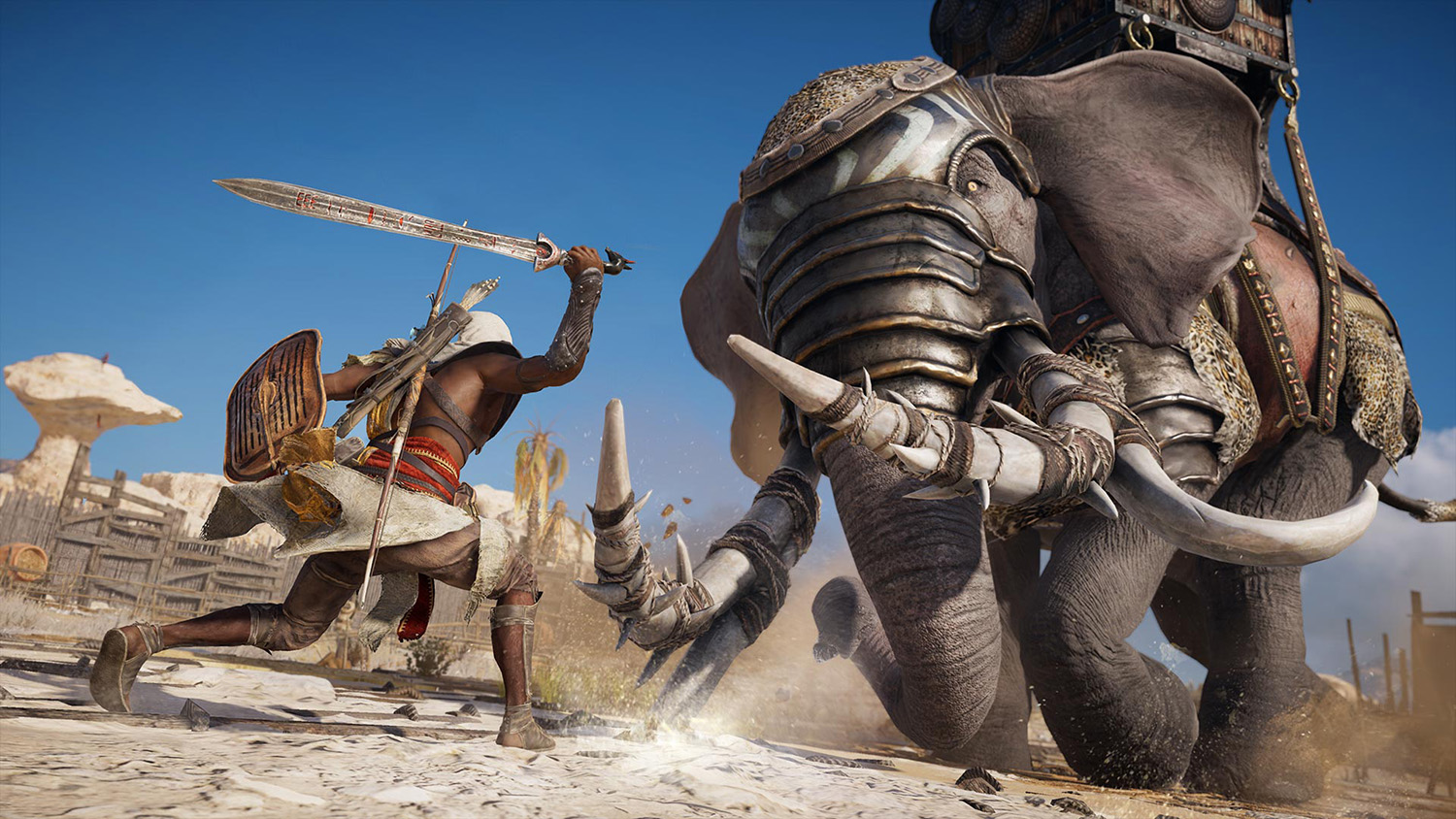Tom's Guide Verdict
Although Origins hardly reinvents the chariot wheel, it's a compulsively playable adventure that's easy to get lost in and hard to put down.
Pros
- +
Big, beautiful world
- +
Entertaining story
- +
Improved exploration
- +
Satisfying character progression
Cons
- -
Combat could be tighter
- -
Performance issues
Why you can trust Tom's Guide
Assassin's Creed used to be synonymous with "annual releases," but after a few same-y games, Ubisoft decided to take a year off and rework a few of the franchise's sticking points. Assassin's Creed Origins ($60; PC, PS4, Xbox One) is, in some ways, a very fresh take on the franchise. Combat is better than ever before, meaningless busywork is at a minimum and customization options are through the roof.
On the other hand, the basic formula of Origins goes all the way back to the very first Assassin's Creed, 10 years ago. You'll still leap from high places, tackle dozens of side quests and sneak past your foes — then bungle the stealth and wind up killing everyone in a panicked frenzy anyway. If Assassin's Creed Origins has one big surprise, it's just how closely it has hewed to some of the earlier games in the series.
And yet, that's hardly a bad thing. Assassin's Creed Origins reminds gamers why they fell in love with the series in the first place. It's massive in scope, giving players a ground-level tour of ancient Egypt, an affable cast of characters and a plot that finally answers some of the franchise's long-running questions. Although Origins hardly reinvents the chariot wheel, it's a compulsively playable adventure that's easy to get lost in and hard to put down.
Gameplay
In Assassin's Creed Origins, you'll step into the well-worn boots of Bayek of Siwa: a Medjay in Ptolemaic Egypt. A Medjay (pronounced almost, but not quite, like "magi") was a sort of ancient Egyptian patrolman, protecting areas of special importance to the pharaoh, or perhaps even the pharaoh himself. Naturally, things go spectacularly wrong for Bayek early on, placing him on a quest for vengeance that will take him to the ends of Egypt and back again.
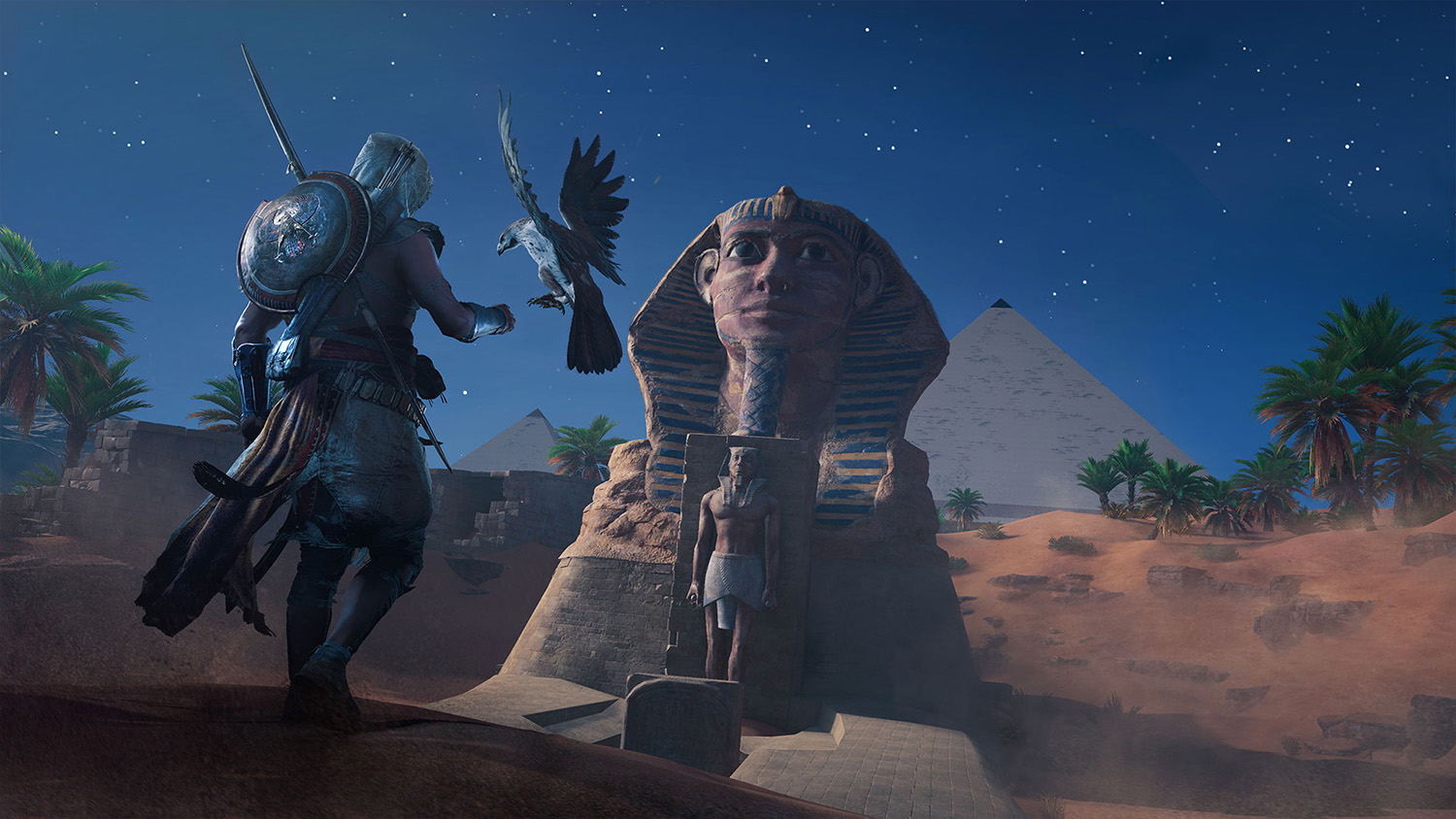
Assassin's Creed has always had three main pillars of gameplay: stealth, exploration and combat. Some games have favored one approach over the other: The original was all about sneaking around, Black Flag was all about seeking out new territory and Syndicate leaned heavily on fighting. While Origins lets you improve your favorite skills, you'll have to do all three before the game is through.
Stealth is similar to the way it's always been: Crouch and sneak around in cover, quietly dispatching foes as you go. The cover options here don't actually feel as robust as they did in Unity or Syndicate; it's not always easy to tell whether an enemy can see you, or what the perfect position for an assassination will be.
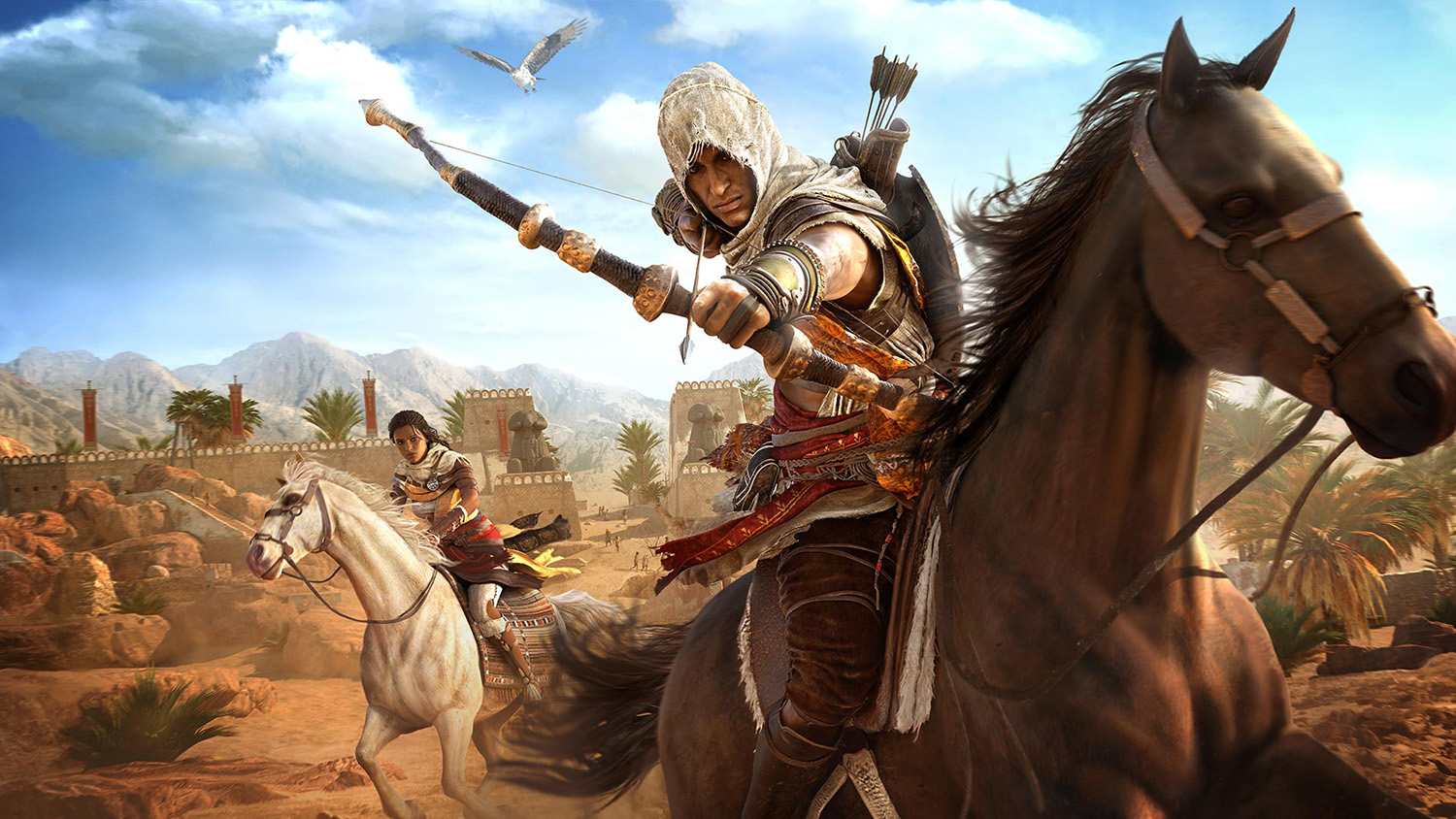
On the other hand, stealth is not as vital as it's been in the past, either. While Assassin's Creed games from Brotherhood onward often penalized you for breaking your cover, especially in plot missions, Origins returns to the very first game's approach. Stealth is all fine and dandy, but if and when things go wrong, you can fight your way out with no penalty beyond your wounded pride.
In fact, one of the best things about Assassin's Creed Origins is that it permits you to make mistakes. There are no optional objectives; you don't fail an assassination mission if you alert your target. Some situations are very difficult to tackle with a head-on assault or a hit-and-run attack, true, but the game at least gives you a chance: It has a sense of freedom and experimentation that we haven't seen in the series in almost a decade, and I didn't realize how much I'd missed it.
As befits the Assassin's Creed series, the architecture in Origins is stunning.
Combat has seen the most significant overhaul from previous games. Instead of waiting for an opportune moment to counterattack, you'll have to constantly move around and dodge your opponents' blows, either breaking their shields or trying to assault them from behind. With attack buttons bound to the right triggers and the importance of slipping in under an enemy's guard, the combat shares more than a passing resemblance to Dark Souls — but it's not nearly as difficult, demanding or precise as its FromSoftware inspiration. Either way, it's a lot more dynamic than before, even if it's not quite tight enough to be one of the great open-world combat systems.
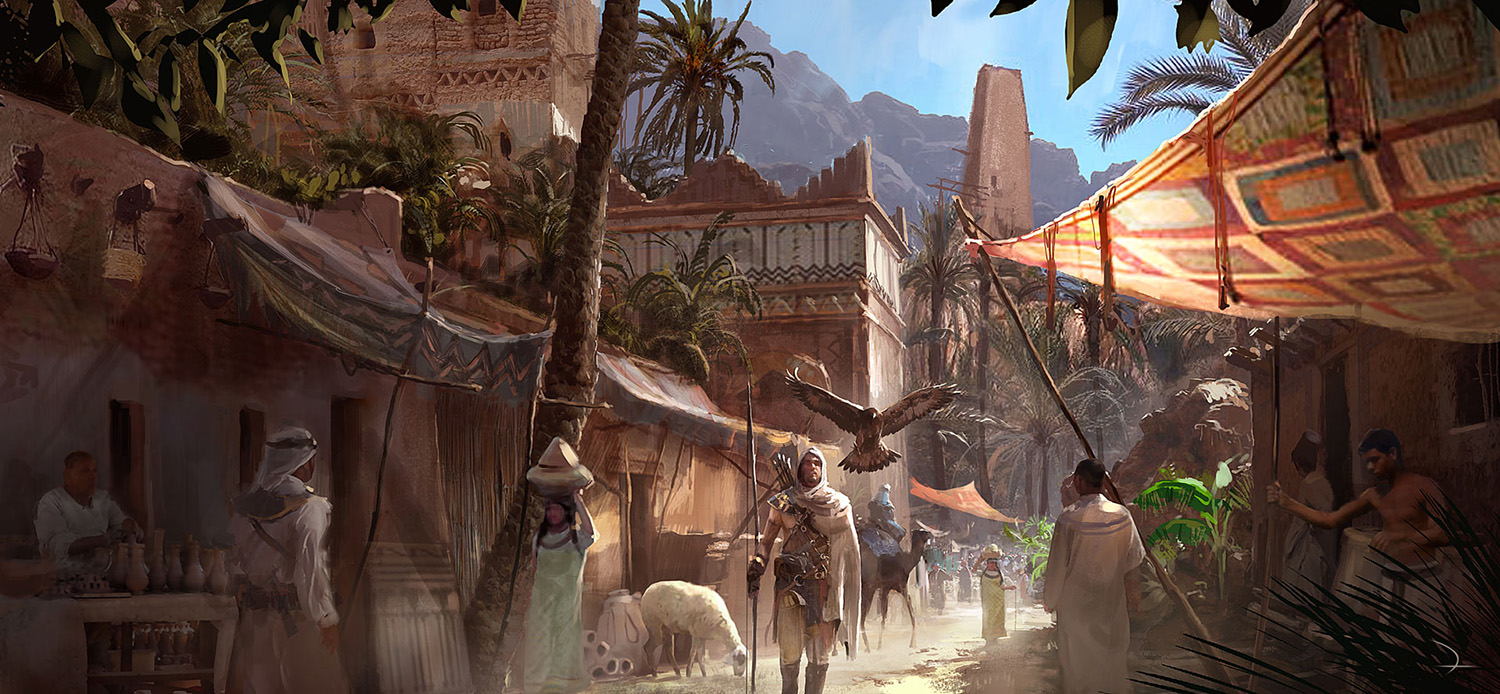
Exploration is also significantly better than before — albeit significantly more time-consuming, so be ready to sink a good 25 to 50 hours into this game, depending on how much you want to find. Whereas games like Unity and Syndicate crammed every inch of screen space with side quests, treasure, viewpoints, collectibles and landmarks, Origins has fewer things to find, with much more distance between them. Side quests are longer and more involved; collectibles have a much more immediate payoff (weapons you can equip right away, clever riddles for additional rewards, and so forth).
MORE: PS4 Games: Our Staff Favorites
Getting Stronger
Even the game's general progression takes most of its cues from the very first Assassin's Creed. You'll venture into a new region of Egypt, where a friendly character gives you instructions to assassinate a new, high-level target. You (probably) won't be strong enough to tackle the foe directly, so you'll complete the varied, interesting side missions in the area, filling in your map and collecting doodads as you go. When you're ready, you can take out your target any way you see fit: an elaborate trap, a one-hit kill and a gigantic melee are all viable options.
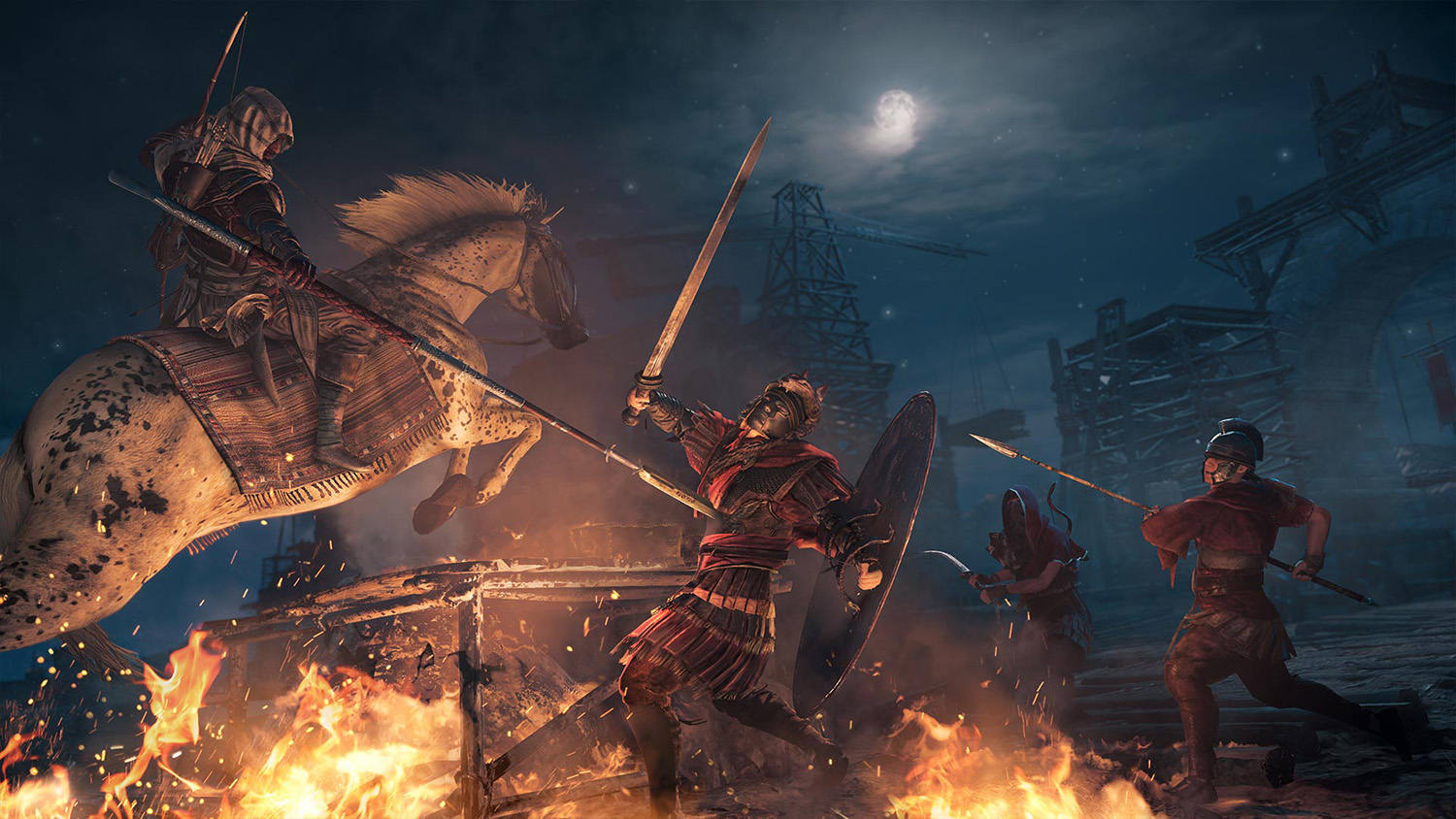
What sets Origins apart from previous games is its elaborate level-up system. While previous games have let you improve your skills through straightforward equipment upgrades or skill trees, Origins has all the trappings of a role-playing game. Quests grant experience points, and leveling up makes you stronger and more durable. You'll also get skill points, which you can allocate as you see fit to improve your combat, stealth and exploration skills. Since Bayek has a baseline proficiency in every skill and every level-up makes you more powerful overall, pretty much any character build is viable, depending on your playstyle.
The real reason to keep playing is Bayek's personal narrative.
You can also collect a variety of different melee weapons, shields and bows, and no two weapons are quite alike. You'll have to choose between raw attack power, speed, range and special skills. Every weapon does something a little different when your adrenaline gauge charges, and these powerful attacks can make or break fights with difficult foes, such as heavily armored centurions or enormous Nile crocodiles.
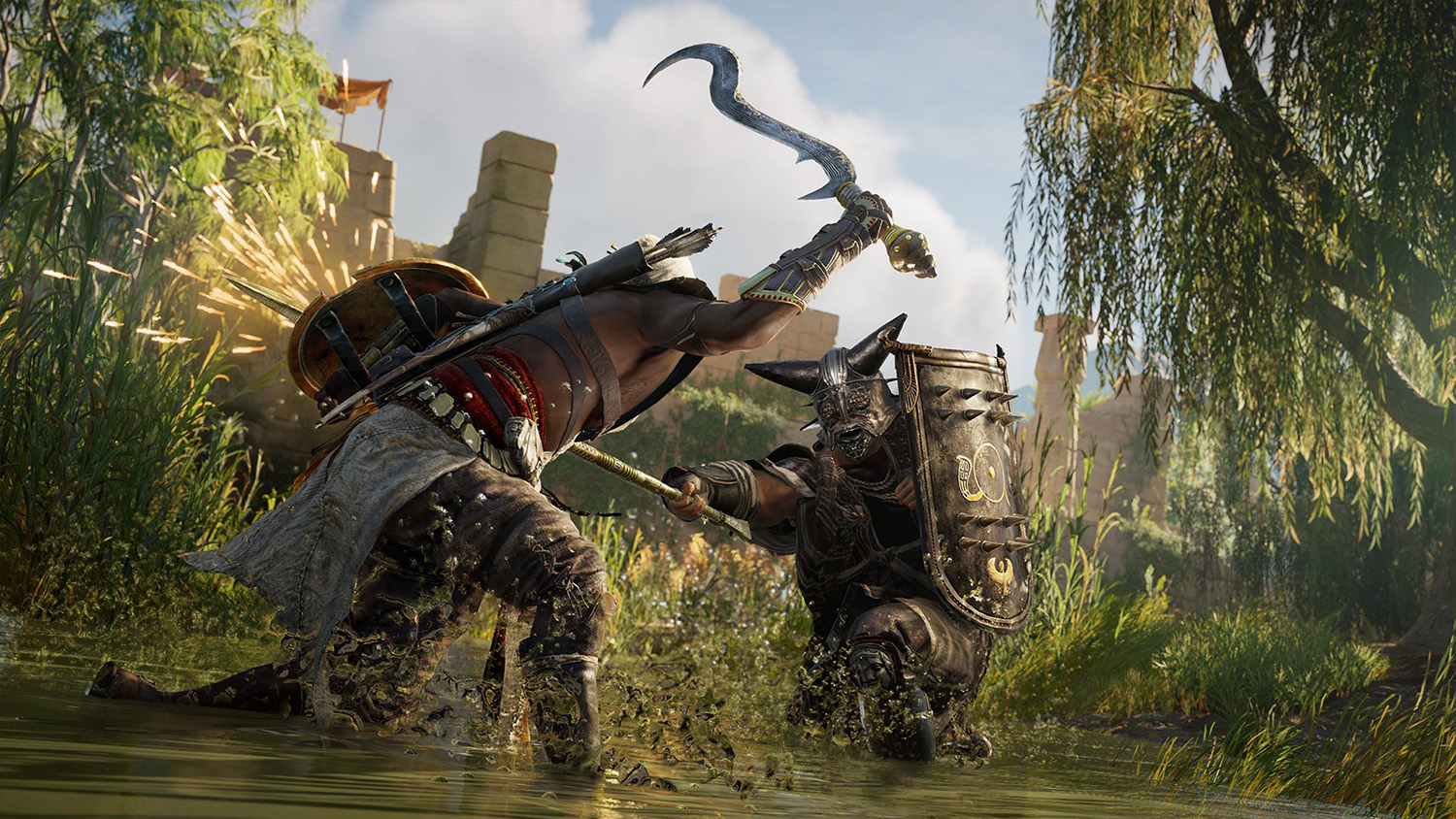
Since Assassin's Creed Origins is not a role-playing game in any meaningful sense of the word, adding an RPG progression system feels a little jarring. It's not clear why Bayek is getting stronger and more skilled as the game goes on, since he was theoretically already a powerful warrior to begin with. From a mechanical point of view, however, the system is a lot of fun, letting you play to your strengths and mitigate your weaknesses. If there's a mission that's giving you a lot of grief, you can always come back after a few level and weapon upgrades and conquer it handily.
MORE: The Best PC Games to Play Right Now
Story
The year is 48 BCE, and three forces vie for power and influence in Egypt. The ethnic Egyptians and their distinctive culture have been there since time immemorial; the ruling Greeks have constructed architectural wonders and installed their own rulers into the pharaonic dynasties; the encroaching Romans want to leverage their growing military might to control one of history's greatest civilizations. If there's a more exciting period in history, Assassin's Creed hasn't covered it yet.
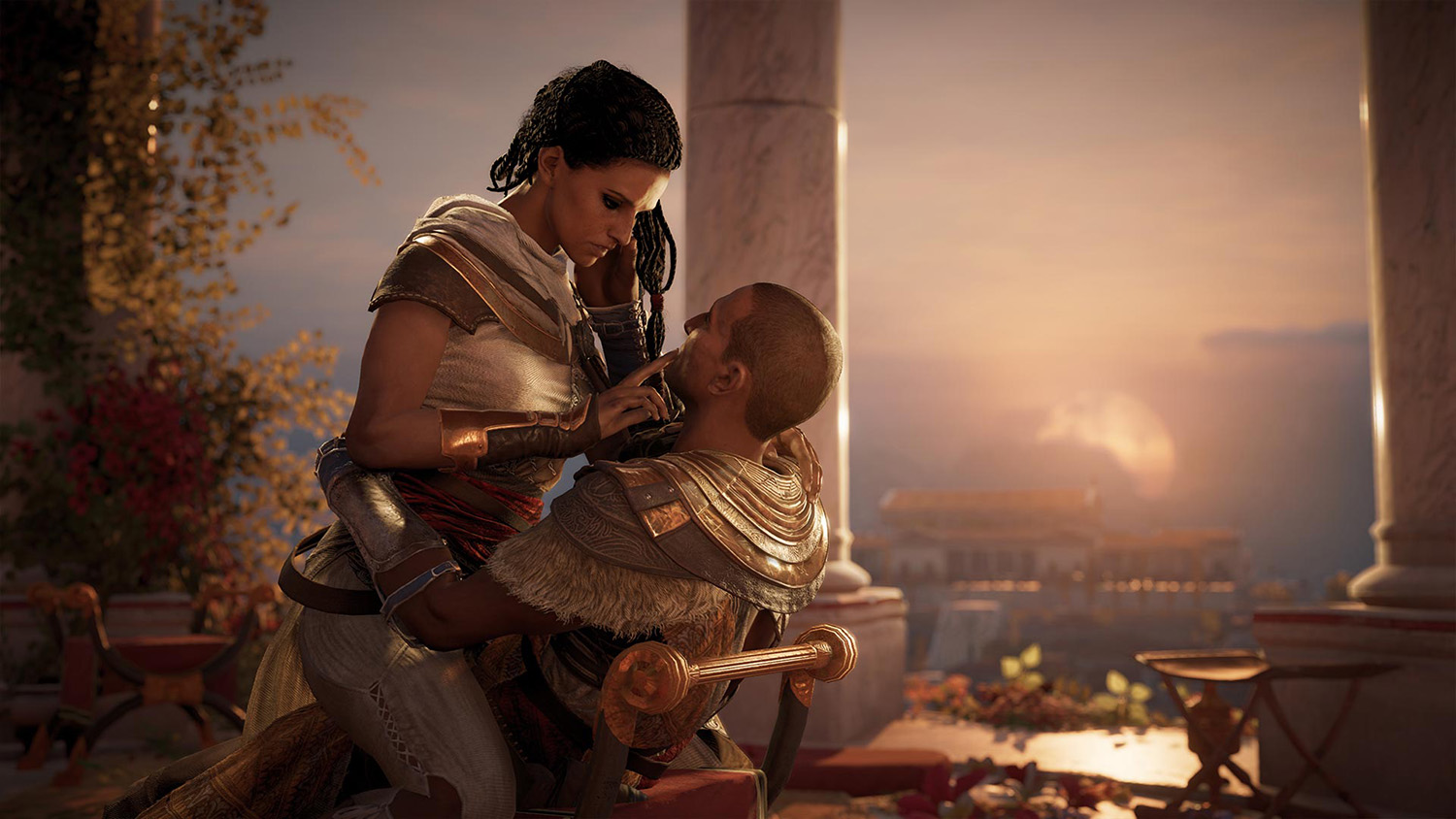
Bayek of Siwa is one of Egypt's last Medjays, who serves the ineffectual Pharaoh Ptolemy XIII. After a secret society kidnaps and murders Bayek's son, Khemu, the warrior swears revenge on everyone involved — potentially up to and including Ptolemy himself. As Bayek hunts down the conspirators one by one, he learns of their connection to a much older and more dangerous group, as well as a potential long-term plan to curtail their influence.
Without giving too much away, Assassin's Creed Origins will indeed answer your lingering questions about series mainstays like the hidden blade, the Pieces of Eden and the Assassin Brotherhood itself. The real reason to keep playing, though, is Bayek's personal narrative.
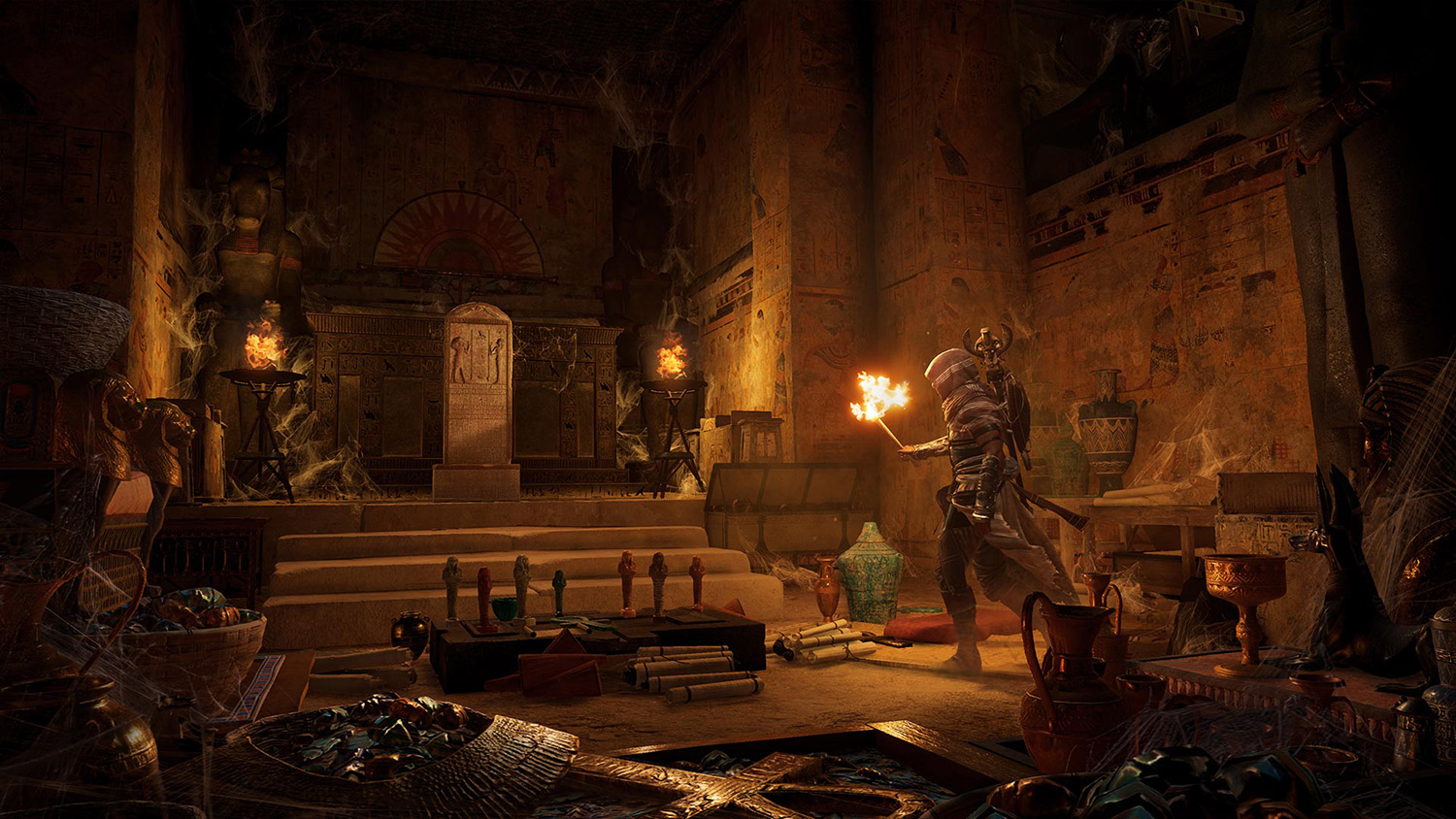
We've seen "middle-aged man out for revenge" narratives in games a hundred times before, but Bayek's journey feels a little different. First off, the method by which Khemu dies complicates matters a bit — you'll see if you play through the first hour of the game. More importantly, Bayek is a nuanced, three-dimensional character, and the characters who join him along the way are often friendly, forthright and honest.
The game has a sense of freedom and experimentation that we haven't seen in the series in almost a decade, and I didn't realize how much I'd missed it.
Like Bayek weighing his victims' deeds against a feather (this is a real part of ancient Egyptian belief), Assassin's Creed Origins weighs the pain of loss against a network of friends and family who have Bayek's back. Of particular note is his wife, Aya, who is an equal partner in Bayek's quest for revenge. Aya is not only alive and well, but takes an active role in the storyline. For all of its salacious Renaissance Italy entries, Assassin's Creed has always felt a little sexless as a series, and Bayek and Aya's relationship is about the best the series has ever portrayed romantic love.
There's also a modern-day component where you play as a Templar researcher named Layla — but if there's someone out there playing the Assassin's Creed series for its metastory, I haven't met him or her yet.
MORE: Vote Now! Best Tech Value Awards - Gaming
Graphics and Sound
Assassin's Creed Origins is compatible with both the PS4 Pro and the (eventual) Xbox One X, letting players take full advantage of 4K resolutions and HDR color palettes. (PC players can do this too, of course.) However, the PS4 patch was not available prelaunch, so I experienced the game at 1080p and 30 fps. The frame rate is disappointing, but perhaps necessary, given the sheer amount of people, animals and buildings on-screen at any time.
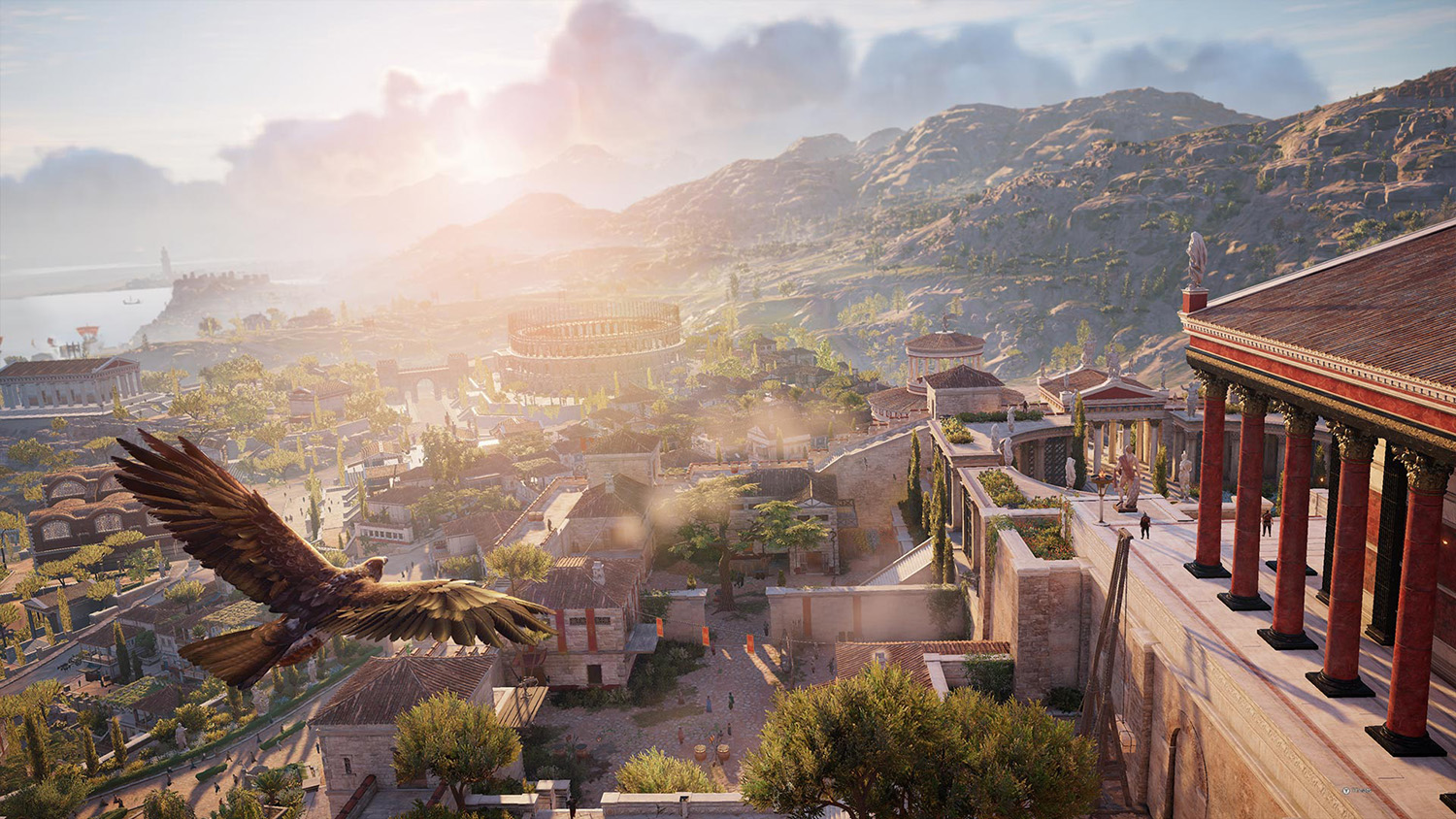
As befits the Assassin's Creed series, the architecture in Origins is stunning. From the white marble lighthouses and libraries of Alexandria to the ornate temples of Memphis, every city looks both distinctive and impressive. Not much remains of Egypt's ancient cities in real life, meaning that Ubisoft had to reconstruct a lot of them from contextual clues and imagination. The result is spectacular, making every location come alive with both Greek and Egyptian residents, vehicles and buildings. Vibrant greens, blues, reds and purples make Assassin's Creed Origins one of the most agreeably colorful games on the market right now.
The deserts between cities are a little less impressive, relying on a lot of red rocks and sand. Unfortunately, you'll have to spend a lot of time traversing some very monotonous desert to find some of the game's more interesting side quests (pyramids, hidden tombs and so forth). At least it's realistic.
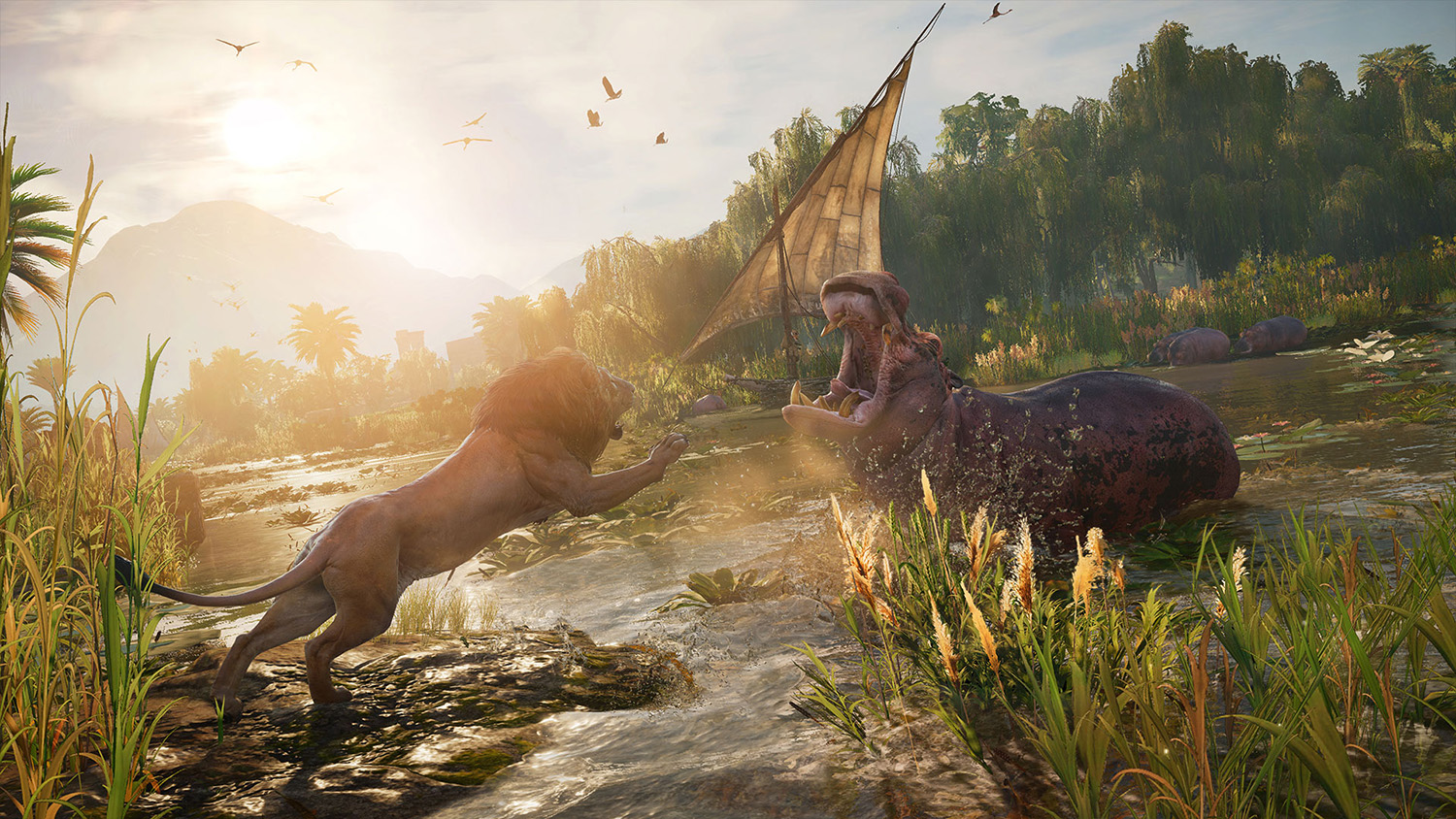
The only major problem with the game is that it freezes and stutters with some regularity, especially in big cities. At least once per play session, I'd be riding along on my camel, minding my own business, when the world would suddenly stop around me — sometimes for 15 to 30 seconds. Then it would resume, but continue to stagger until I found a less populous area. In its defense, the game never crashed, but as the third Assassin's Creed title on the current console generation, Origins shouldn't have these problems at all.
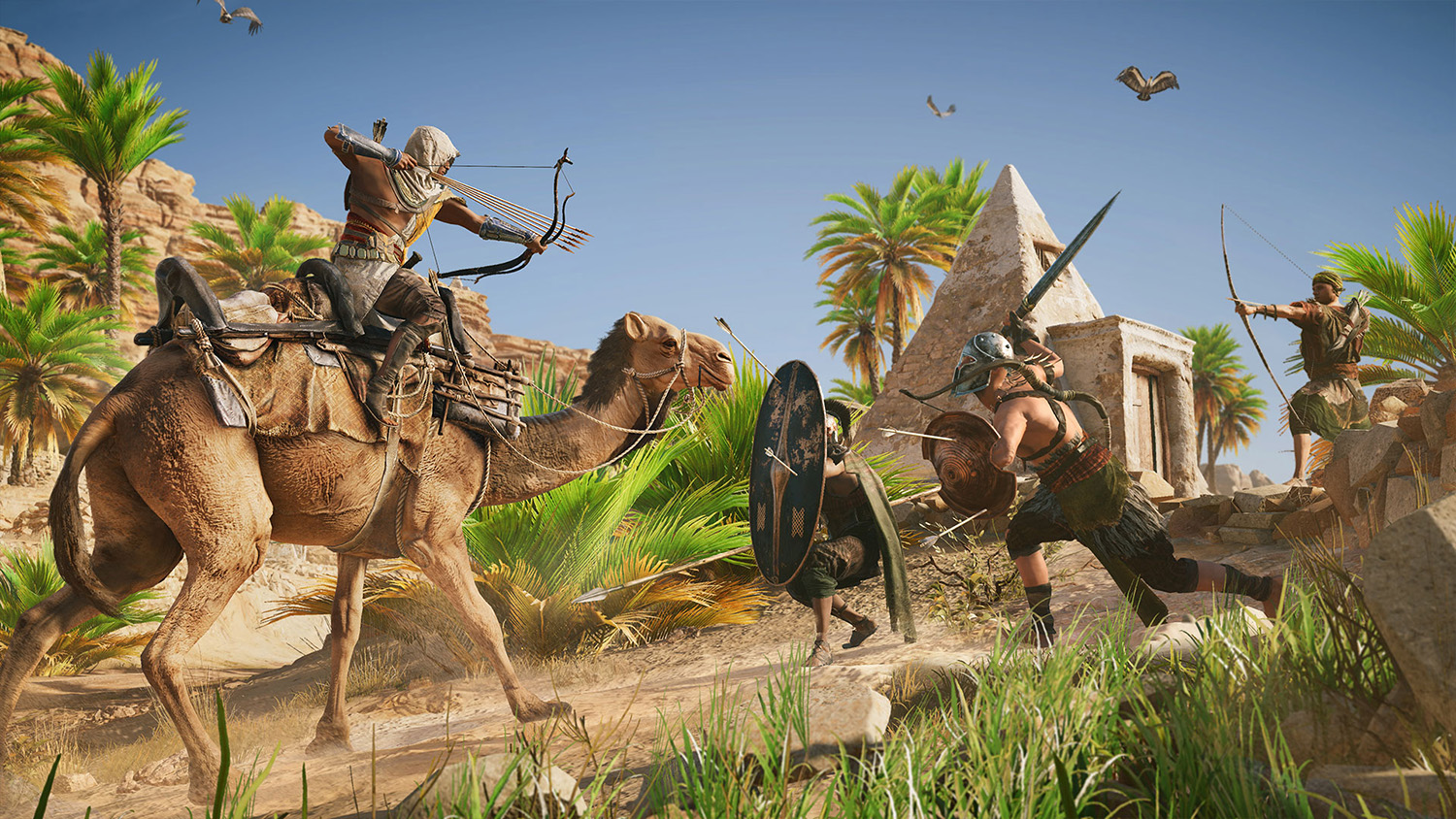
The music also strikes a beautiful balance between Greek and Egyptian styles, complete with lots of strings, Dorian modes and understated percussion. Unfortunately, the game doesn't have any of the tavern-style folk songs that made Black Flag, Unity and Syndicate so much fun, but given how little music has survived from Ptolemaic Egypt, it's a fair exclusion.
Voice acting is up to usual series standards as well, with Abubakar Salim (Black Mirror) giving a nuanced, heartfelt performance as Bayek. He captures the character's indescribable grief, as well as his generally helpful nature and wry humor. Alix Wilton Regan (The Amazing World of Gumball) turns in a similarly spirited performance as Aya.
Bottom Line
After taking a year to retool, fans may have been expecting a very different kind of Assassin's Creed. However, even if the combat looks very different from before, Origins is the most traditional Assassin's Creed entry in years. There's parkour, there's a story about revenge, there are a bunch of historical cities recreated with painstaking detail, and there's some thoroughly decent stealth that you can ignore completely in favor of brutalizing every armed guard that crosses your path.
And yet, the small tweaks in Assassin's Creed Origins add up to a much more focused experience than before. With less needless "stuff" cluttering up the map screen, you can take time to enjoy the gorgeous scenery, the refined combat and the satisfying story. Aside from the attention to historical detail, there's nothing mind blowing about the game — but the same could be said of the first Assassin's Creed.
Ultimately, fans probably needed a break from Assassin's Creed, but Origins demonstrates that the series can still deliver large, deep, high-concept historical adventures with a consistent degree of quality.
Oh, and it actually does have some connections to the soporific Assassin's Creed movie. Which still doesn't make the film worth your time. Fair warning.
Credit: Ubisoft
Marshall Honorof is a senior editor for Tom's Guide, overseeing the site's coverage of gaming hardware and software. He comes from a science writing background, having studied paleomammalogy, biological anthropology, and the history of science and technology. After hours, you can find him practicing taekwondo or doing deep dives on classic sci-fi.
-
deepo "Assassin's Creed Origins is compatible with both the PS4 Pro and the (eventual) Xbox One X, letting players take full advantage of 4K resolutions and HDR color palettes. (PC players can do this too, of course.) "Reply
Just want to double check: Does this mean that the PC version supports HDR?
EDIT: To answer my own question, here's Ubisoft themselves:
"IMPORTANT:
There will be another Title Update available in early November, which will most notably include 4K and Dolby Atmos support for Xbox One X and support of HDR displays for all platforms." -
davidson.boyette Good information in the video. The on-screen talent really needs to relax and put his arms down. Speaking with your arms and hands is great and engaging but if you are too stiff, it's extremely distracting. Either don't use your hands/arms at all or keep it minimal and just let it accent or emphasize what your saying like exclamation marks. Content of the video and article is great. You did a good job getting me pumped for assassin's creed. Keep it up!Reply
